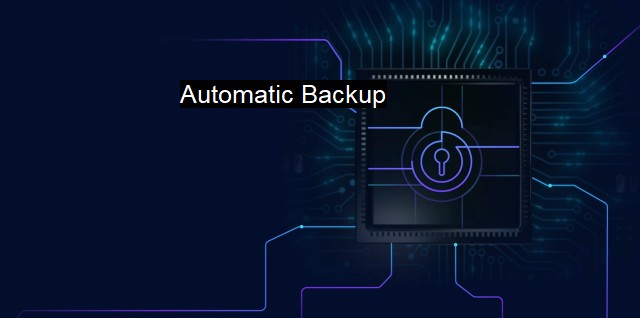What is Automatic Backup?
Why Automatic Backup is Vital for Cybersecurity: Protecting Your Digital Resources from Virus Attacks
Automatic backup refers to a process in computer systems where important data and information are copied and stored in secondary locations regularly, without requiring manual intervention. It's an invaluable strategy in the cybersecurity realm as it protects valuable data from loss that can potentially occur due to a variety of risks, such as cyberattacks, system failures, or human errors.Understanding the link between automatic backup and cybersecurity becomes clearer when one appreciates the value of data in today's digital age. Data is the lifeblood of the digital economy. It runs through the veins of every aspect of modern life, from personal details and financial information to institutional research and company secrets. Consequently, the malicious intention behind many cyber-attacks is to compromise this valuable data.
Cybersecurity strategies strive to keep data secure from such malicious attempts. Firewalls, intrusion prevention systems, and antivirus software are some common protections designed to safeguard systems. While these are pivotal, they are not invincible and have their limitations. No matter the sophistication of these measures, some cyber threats can bypass these sophisticated security systems. Plus, threats are not only external; data can also be compromised from data corruption, system malfunction, or accidental deletion.
Herein lies the importance of automatic backup as a security measure. The automatic backup process is designed to continually save data to a reserved space or backup storage device without the need for direct human action. This ensures an up-to-date copy of the data is stored somewhere else. The backed-up data can be duplicated to various remote servers to multiply the safety layers.
In times when direct security measures fail, automatic backup acts as an insurance protocol against data loss. If the primary data is lost in any way— either it's infected by a computer virus, deleted accidentally, or becomes a victim of hardware failure—the backup provides a mechanism to salvage and restore the data. It provides a restorative weave in the tapestry of cybersecurity as it does not prevent the damage from happening per se but provides a contingency when damage occurs.
Backup systems work closely with antivirus software. If the antivirus identifies a virus on a computer, it cleans up the infected files, which can sometimes lead to data loss. In such scenarios, having an automatic backup system allows for retrieval of a clean version of the data, making sure no information is lost in the antivirus cleanup process.
In terms of frequency, some backup systems recover data daily, while others do so on a real-time basis, providing an instant backup. Services usually let users choose the backup schedule as per their convenience and need. features like data encryption during backup, password protections, multi-factor authentication, and scheduling, make for more comprehensive and secure automatic backup systems.
Automatic backup is an essential component of cybersecurity strategies. In an age where security measures may fall short against evolving and unpredictable cyber threats, it cultivates an additional layer of protection. Oriented towards disaster recovery, automatic backup fosters independent data copies, protecting against hardware malfunction, human error, and malicious actions on cyberspace. Coupled with antivirus systems, automatic backup becomes a dynamic duo safeguarding the cybersecurity arena's most prized asset—data. Therefore, both organizations and individual users should incorporate automatic backup methods in their security approaches to ensure comprehensive protection against data loss.

Automatic Backup FAQs
What is automatic backup?
Automatic backup is a process where the system automatically backs up data on a regular basis without requiring any manual intervention from users. It helps to ensure that data is always available in case of a loss or damage to the original copy.Why is automatic backup important for cybersecurity?
Automatic backup is important for cybersecurity because it helps to prevent data loss due to cyber attacks, malware infections, or system failures. It ensures that critical data is always available and can be restored quickly in case of an emergency.How does an automatic backup work with antivirus software?
Automatic backup works with antivirus software by ensuring that backups are made before the antivirus scans the system for potential threats. This helps to prevent the loss of critical data that may be infected with malware. It also ensures that the backup copy is free of viruses and can be used to restore the system safely.What are the benefits of using automatic backup?
The benefits of using automatic backup include reduced risk of data loss, improved data availability and accessibility, simplified backup management, and enhanced data protection. It also helps to ensure that critical data is always available and can be restored quickly in case of an emergency. Overall, automatic backup is an essential component of a comprehensive cybersecurity strategy.| | A | | | B | | | C | | | D | | | E | | | F | | | G | | | H | | | I | | | J | | | K | | | L | | | M | |
| | N | | | O | | | P | | | Q | | | R | | | S | | | T | | | U | | | V | | | W | | | X | | | Y | | | Z | |
| | 1 | | | 2 | | | 3 | | | 4 | | | 7 | | | 8 | | |||||||